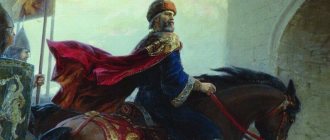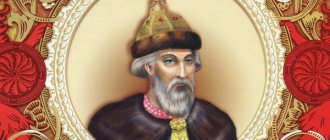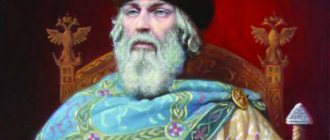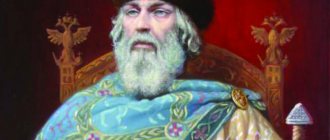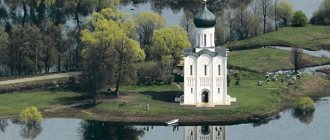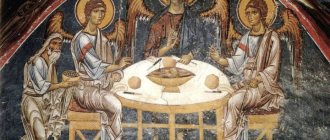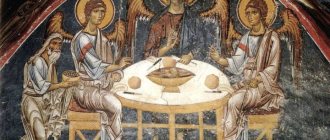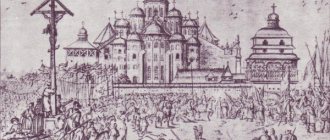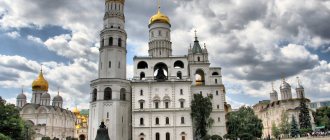The teaching of Vladimir Monomakh is the prince’s message to his children and descendants. Monomakh sees morality as the foundations of the human personality. He teaches his children about the need to help the poor, not to destroy Christian souls, to be faithful to oaths, to be hospitable, to honor elders and priests, not to be lazy, not to get drunk, not to fornicate, not to lie.
The teaching also contains memories of Monomakh’s campaigns against Polotsk, Vyatichi, Poles and Polovtsians, a description of his youth and hunting various wild animals.
The first edition was compiled by Prince Vladimir around 1099-1100, the final edition not earlier than 1118.
Vladimir Monomakh's will to his children, 1125. Lithograph based on fig. B. Chorikova. 1836 Original text
Summary and Analysis
Vladimir Monomakh came up with the idea of writing a “Teaching” for his children after an unpleasant meeting with the brothers’ ambassadors. They wanted to enlist his support in the case against Rostislavich. But the prince refused to assist them, because he already had an unpleasant experience of conflict with Oleg Svyatoslavich and was against internecine strife.
The author of the “Teaching” appears before us as a highly educated person, well versed in the literature of his time, as can be seen from the numerous quotes that he gives.
At the beginning of the Instruction, Monomakh gives a number of moral instructions:
- Respect people older than yourself - like your own father, younger than yourself - like your brothers
- Help those in need who ask for water and food - feed and drink.
- Protect the weak and prevent the authorities from infringing on ordinary people.
- Honor hospitality - always greet the person you meet and wish him well
- Don't be lazy and beware of lies
In his opinion, a prince should always take care of the welfare of his country and its inhabitants. A bad prince is one who thinks only about filling the princely treasury. The ideal prince thinks not about himself, but about ordinary residents.
Gradually, “Instruction” develops into an autobiography. Monomakh writes that he made eighty-three campaigns, concluded twenty peace treaties, destroyed many Polovtsian princes, but released many after being captured. After that, he shares his memories of the hunt. The prince speaks of himself as an active person. Everywhere he tried to take personal part: in a battle or a peaceful event, or on a hunt.
In general, the “Instruction” is colored by personal feelings, written in a confessional, elegiac tone, and also reflects a vision of everyday life and the era. Contrary to the literary canons of the depiction of the prince, Vladimir is endowed with individual human traits. This is not only a warrior, a statesman, but also a feeling, suffering, acutely experiencing life events. It is important for him that children and other people to whom his words are addressed take the instruction “into their hearts.”
In the final part, the prince once again addresses his children.
About the product
“The Teachings of Vladimir Monomakh” is rightfully considered a literary monument of the 12th century, which left a big mark not only in literature, but also in the history of Russia. The work written by the Grand Duke of Kyiv Vladimir Monomakh is also known as “Instruction for Children.”
We recommend reading online a summary of “The Teachings of Vladimir Monomakh” on our website. A retelling of the story will be useful in preparing for a literature lesson and for a reading diary.
The material was prepared jointly with a teacher of the highest category, Ilyina Galina Sergeevna.
Experience as a teacher of Russian language and literature - 36 years.
Full text of the teaching
I, humble, by my grandfather Yaroslav, blessed, glorious, named in baptism Vasily, Russian name Vladimir, beloved father and mother from the Monomakh family... and Christians for the sake of people, for how many of them I saved by my mercy and by my father’s prayer from all troubles! Sitting on the sleigh, I thought in my soul and gave praise to God, who saved me until these days, a sinner. My children or anyone else, when listening to this letter, do not laugh, but whichever of my children loves it, let him accept it in his heart and not become lazy, but work.
First of all, for the sake of God and your soul, have the fear of God in your heart and give generous alms - this is the beginning of all good. If anyone doesn’t like this letter, then let them not laugh, but they will say: on a long journey, while sitting on a sleigh, he said something absurd.
For ambassadors from my brothers met me on the Volga and said: “Hurry to us, and we will drive out the Rostislavichs and take away their volost; if you don’t come with us, then we will be on our own, and you will be on your own.” And I answered: “Even though you are angry, I cannot go with you or break the kiss of the cross.”
And, having released them, he took the Psalter in sadness and unbent it, and this is what came out to me: “What are you sad about, my soul? Why are you embarrassing me? - And so on. And then I collected these favorite words and arranged them in order and wrote them. If you don't like the last ones, at least take the first ones.
“Why are you sad, my soul? Why are you embarrassing me? Trust in God, for I believe in him.” “Do not compete with the evil ones, do not envy those who do iniquity, for the evil ones will be destroyed, but those who obey the Lord will possess the earth.” And a little more: “And there will be no sinner: you will look at his place and will not find him. The meek will inherit the earth and many will enjoy peace. The sinner plots against the righteous and gnashes his teeth at him; the Lord will laugh at him, for he sees that his day will come. Sinners have drawn their weapons and are drawing their bows to pierce the poor and needy and to slay the upright in heart. Their weapons will pierce their hearts, and their bows will be broken. A little is better for the righteous than much wealth for sinners. For the strength of sinners is broken, but the Lord strengthens the righteous. For sinners will perish, but He has mercy and gifts on the righteous. For those who bless him will inherit the earth, but those who curse him will be destroyed. Man's feet are guided by the Lord. When he falls, he will not be broken, for the Lord supports his hand. He was young and old, and did not see the righteous abandoned, nor his descendants asking for bread. Every day the righteous give alms and lend, and his tribe will be blessed. Turn away from evil, do good, find peace and drive away evil, and live forever and ever.”
“When people rebelled, they would devour us alive; when his wrath was angry with us, the waters would drown us.”
“Have mercy on me, O God, for man has trampled me; Attacking every day, it presses me. My enemies have trampled me, for there are many who rise up against me from above.” “The righteous will rejoice and, when he sees vengeance, he will wash his hands in the blood of the sinner. And the man will say; “If there is a reward for the righteous, then there is a God who executes judgment on earth.” “Free me from my enemies, O God, and protect me from those who rise up against me. Deliver me from the workers of iniquity and save me from the man of blood, for they have already captured my soul.” “For wrath is in the moment of his wrath, but all life is in his will: mourning may endure for a night, but joy cometh in the morning.” “For your mercy is better than my life, and let my mouth praise you. So I will bless you during my lifetime and in your name I will lift up my hands.” “Hide me from the congregation of the wicked and from the multitude of those who do injustice.” “Rejoice, all you righteous in heart. I will bless the Lord at all times; His praise will never cease,” and so on.
For as Vasily taught, having gathered young men: to have a pure and immaculate soul, a thin body, a meek conversation and to keep the word of the Lord: “Eat and drink without great noise, be silent with the old, listen to the wise, submit to the elders, have love with equals and younger ones, without speaking wickedly, but understanding more; do not rage with words, do not blaspheme in conversation, do not laugh a lot, be ashamed of your elders, do not talk to unlucky women and avoid them, keeping your eyes down and your soul up, do not shy away from teaching those who are carried away by power, to place universal honor at nothing. If any of you can benefit others, let him hope for reward from God and enjoy eternal blessings.” “Oh, Lady Mother of God! Take away pride and insolence from my poor heart, so that I will not be magnified by the vanity of this world” in this insignificant life.
Learn, believer, to be an achiever of piety, learn, according to the Gospel word, “control of the eyes, restraint of the tongue, humility of the mind, submission of the body, suppression of anger, to have pure thoughts, motivating yourself to good deeds, for the sake of the Lord; the deprived - do not take revenge, the hated - love, the persecuted - endure, the blasphemed - be silent, kill sin. “Deliver the oppressed, give justice to the orphan, justify the widow. Come let us unite, says the Lord. If your sins are stained, I will whiten them like snow,” and so on. “The spring of fasting and the flower of repentance will dawn; Let us cleanse ourselves, brothers, from all blood, physical and mental. Calling upon the light-giver, let us say: “Glory to you, lover of mankind!”
Truly, my children, understand that God, a lover of mankind, is merciful and merciful. We humans are sinners and mortals, and if someone does evil to us, we want to devour him and shed his blood soon. And our Lord, possessing both life and death, tolerates our sins above our heads throughout our entire life. Just as a father, loving his child, beats him and again draws him to himself, so our Lord showed us victory over our enemies, how to get rid of them and defeat them with three good deeds: repentance, tears and alms. And this, my children, is not a difficult commandment of God, how to get rid of your sins and not lose the kingdom of heaven with these three deeds.
For God’s sake, don’t be lazy, I pray you, don’t forget those three things, they’re not hard; neither by seclusion, nor by monasticism, nor by fasting, which other virtuous people endure, but in small deeds one can receive God’s mercy.
“What is a person, how do you think about him?” “Great art thou, O Lord, and wonderful are thy works; the human mind cannot comprehend your miracles,” and again we will say: “Great are you, O Lord, and wonderful are your works, and blessed and glorious is your name forever throughout all the earth.” For who will not praise and glorify your power and your great miracles and blessings arranged in this world: how the sky is structured, or how the sun, or how the moon, or how the stars, and darkness, and light? And the land on the waters was laid, Lord, by your providence! Various animals and birds and fish are decorated with your craft, Lord! And let us marvel at this miracle, how he created man from dust, how diverse human faces are - if we collect all people, not everyone has the same appearance, but each has his own facial appearance, according to God's wisdom. And let us marvel at how the birds of heaven come from paradise, and first of all into our hands, and do not settle in one country, but both the strong and the weak go across all lands, at God’s command, so that the forests and fields are filled. Yet God gave this for the benefit of people, for food and joy. Great, Lord, is your mercy towards us, since you created these blessings for the sake of sinful man. And the same birds of heaven are wise by you, Lord: when you command, they will sing and make people happy; and when you do not command them, even those who have a tongue will become numb. “And blessed, O Lord, and greatly glorified!” “He created and performed all kinds of miracles and these blessings. “And whoever does not praise you, Lord, and does not believe with all his heart and with all his soul in the name of the father and the son and the holy spirit, let him be cursed!”
After reading these divine words, my children, praise God, who has given us his mercy; Otherwise, what follows is an instruction from my own weak mind. Listen to me; If you don’t accept everything, then at least half.
If God softens your heart, shed tears for your sins, saying: “Just as you had mercy on the harlot, the thief and the publican, so have mercy on us sinners.” And do the same in church and when you lie down. Don’t miss a single night—if you can, bow to the ground; if you get sick, then three times. Don’t forget this, don’t be lazy, for with that night bow and prayer a person defeats the devil, and whatever sins he sins during the day, that person gets rid of. If you don’t have anything to do even while riding a horse, and if you don’t know how to say other prayers, then cry out “Lord have mercy” incessantly in secret, for this prayer is better than all of them, rather than thinking foolish things while riding.
In general, do not forget the more wretched, but, as much as you can, feed and serve the orphan and the widow yourself, and do not let the strong destroy a person. Kill neither the right nor the guilty, and do not command him to be killed; even if you are guilty of death, then do not destroy any Christian soul. When you say anything, good or bad, do not swear to God, do not be baptized, for you have no need for this. If you have to kiss the cross, brethren or someone else, then, having checked your heart, what you can stand on, kiss it, and having kissed it, be careful not to destroy your soul by transgressing. Honor bishops, priests and abbots, and lovingly accept blessings from them, and do not distance yourself from them, and love and care for them as much as you can, so that you can receive them from God through their prayer. Above all, have pride in your heart and mind, but let us say: we are mortal, today we are alive, and tomorrow in the grave; all this that you gave us, not ours, but yours, entrusted it to us for a few days. And don’t save anything in the land, it’s a great sin for us. Honor the old as your father, and the young as your brothers. Do not be lazy in your home, but watch everything yourself; Do not rely on the tiun or on the youth, lest those who come to you laugh at your house or at your dinner. When you go to war, do not be lazy, do not rely on the commander; do not indulge in drinking, eating, or sleeping; Dress up the guards yourself and at night, placing guards on all sides, lie down near the soldiers, and get up early; and do not take off your weapons in a hurry, without looking around out of laziness, because suddenly a person dies. Beware of lies, and drunkenness, and fornication, because the soul and the body perish from this. Wherever you go through your lands, do not let the youths harm either your own or strangers, or villages, or crops, so that they do not curse you. Wherever you go and where you stop, give drink and food to the beggar, but most of all honor the guest, no matter where he comes to you, whether he is a commoner, or a noble, or an ambassador; if you cannot honor him with a gift, then with food and drink: for as they pass, they will glorify a person throughout all lands, either good or evil. Visit the sick, see off the dead, for we are all mortal. Don’t let a person pass without greeting him, and say a kind word to him. Love your wife, but don’t give them power over you. And here’s the basis for everything: have the fear of God above all else.
If you forget this, then re-read it more often: I won’t be ashamed, and you will feel good.
What you can do well, don’t forget, and what you can’t do, learn it - like my father, sitting at home, he knew five languages, that’s why he received honor from other countries. Laziness is the mother of everything: what someone knows how to do, he will forget, and what he doesn’t know how to do, he will not learn. When you do good, do not be lazy about anything good, first of all towards the church: do not let the sun find you in bed. This is what my blessed father and all good and perfect men did. At matins, having given praise to God, then at sunrise and seeing the sun, one must joyfully glorify God and say: “Enlighten my eyes, O Christ God, who has given me your wondrous light!” And again: “Lord, multiply my years, so that in the future, having repented of my other sins, I will correct my life”; So I praise God even when I sit down to think with my squad, or am about to judge people, or go hunting or collect tribute, or go to bed. Sleeping at noon is ordained by God; According to this institution, both animals, birds, and people rest.
